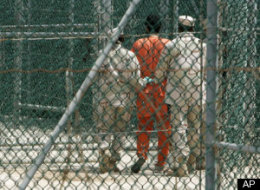
Why does the Obama administration continue to detain foreign nationals for years on end with only the flimsiest of evidence to justify their ongoing detention? Of 31 cases completed since the Supreme Court allowed detainees to challenge their detention in court, 28 were found to be held unlawfully. Of those 28, 19 are still in detention. WTF????
ProPublica reports:
New Gitmo Decision Offers Unusual Insight Into Weakness of Government Evidence:
by Chisun Lee, ProPublica -
A recent federal court decision that yet another Guantanamo captive’s detention is illegal offers the most detailed picture to date of how the government is struggling, often unsuccessfully, to justify indefinite imprisonments with sometimes thin and unverifiable evidence. The government’s difficulties in proving these cases are likely to persist even if the detainees are moved to U.S. soil or if a new detention review system is created.
The judge evaluating Al Mutairi’s imprisonment issued a lengthy written opinion detailing and eviscerating the government’s evidence.
Al Mutairi’s case was the first to be completed by Colleen Kollar-Kotelly, a judge with considerable national security experience, in the slew of lawsuits brought by some 200 Guantanamo inmates. In these lawsuits, known as habeas corpus petitions, the detainees claim the government wrongly imprisoned them as enemies in the conflict with al Qaeda and the Taliban. The cases have been randomly assigned among the 15 judges of the federal trial court in Washington, D.C.
ProPublica recently examined 31 cases completed since a June 2008 Supreme Court decision empowered federal trial courts to scrutinize and, if called for, overturn presidential detention decisions. Case by case, the judges have been answering core questions that policy experts have addressed in theory: When can the president place someone in preventive detention, and how solid does the evidence need to be? (Our analysis of the cases was co-published as an op-ed by the New York Times.)
Judges have found 28 detainees to be unlawfully held. Nineteen of these men remain jailed at Guantanamo. More lawsuits continue to move ahead...
After reviewing the government’s classified evidence, the judge last week concluded that "there is nothing in the record beyond speculation" that Al Mutairi had "become a part of al Qaida or an associated force of al Qaida," as the government alleged. She ordered the Obama administration to "take all necessary and appropriate steps to facilitate Al Mutairi’s release forthwith."
The government’s evidence failed to sway her, because it was sparse and unreliable.
She said some of it was "unfinished" or "raw" intelligence that, by the government’s own admission, had never been "fully analyzed for its ‘reliability, validity, and relevance.’"
A "typographical error in an intelligence report" led the government incorrectly to claim for more than three years that Al Mutairi had manned an anti-aircraft weapon in Afghanistan, the judge wrote. The report had confused Al Mutairi’s internment serial number – a unique identifier assigned each detainee – with that of the person actually suspected of manning the weapon.
The government gave the judge no reason to think the appearance of Al Mutairi’s name on certain prison lists – parts of the opinion suggest the prison was in Pakistan – meant he was affiliated with al Qaeda, the judge said. "Multiple independent sources" had testified that such lists were collected by guards merely to inform family members of the whereabouts of the incarcerated, and administration lawyers supplied no proof to the contrary.
Among the pieces of evidence the judge rejected in the Al Mutairi case was a passage from an account of the detainee’s own interrogation...
Kollar-Kotelly discussed Al Mutairi’s "agitated" state of mind at the time he gave the statement and says "he appears to have been goaded into making these statements by the linguist in the interrogation room."
During another interrogation, the judge said, an agitated Al Mutairi claimed that 'he was Osama bin Laden." She quoted a passage from that interrogation report, which is striking because it reveals the detainee’s seeming frustration and despair over his treatment in U.S. custody:
ISN [Internment Serial No.] 213 was uncooperative. He stated that he wished to be called Osama bin Laden . . . ISN 213 stated he was an enemy of America because Americans had told him so. Americans cursed his parents. Prior to the war, he’d had no problem with Americans. But due to the situation at Guantanamo Bay, Cuba, and legal process being so useless, he might as well be Osama bin Laden, since he was never going to be freed from U.S. custody.
_______________________________________________________________________________________
My question is: why does the Obama administration insist on retaining these prisoners? What happened to Obama the candidate who insisted on closing GITMO detention center ASAP?



















